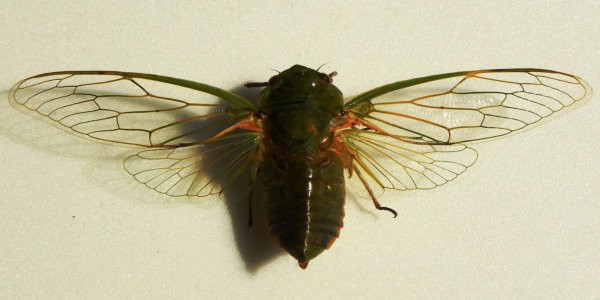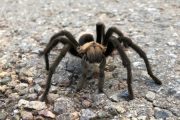And now, barring Colin’s return, was another loathsome insect, a cigar-shaped incubus at least six inches long, with a dark green body, too many legs, and long, filmy wings folded back on its abdomen. His heart leaped with a sudden thought: it was so still– perhaps it was dead! But dead insects fall to the ground; they don’t cling to trees. It moved its wings slightly as if to reassure him it was very much alive, only resting, and Colin retreated. Horror of horrors: there were two of them! Best not to aggravate them. Perhaps they did not know he was there. Colin calculated how quickly he could run past the tree and through the gate to safety, but what if one of them flew into his face to thwart his passage, or worse, deliberately entangled itself in his hair with a dreadful whir and click of wings and legs as it expired in a bizarre kamikaze triumph? He shuddered, irrationally convinced these two (were there others lurking among the leaves?) had been appointed to prevent him from getting home with the bread. He had not forgotten— who could?— the Great Chicharra Invasion only days before…
From tall trees and jungle undergrowth behind the house, in the pitch-black depths of a tropical night shrieking with insect life, and attracted for some reason that night, but no other in Colin’s memory, by light from within the house, squadrons of kamikaze chicharras had launched themselves in desperate fury at Quinta Rosada. In awe and mounting excitement, Colin and his two brothers had watched transfixed, as they beat frenzied tattoos on the screens and window panes in their hundreds, seeking to immolate themselves in the bath of heat and light from within. Neil and Devon went from room to room in the house, turning off lights, but this did not discourage the invaders. Colin watched them in the dark in the boys’ shared bedroom, horrified as they threw themselves against the glass, and their wings beat against the wire netting. Some, apparently stunned into immobility, still clung to the screen, their legs poking through into the boys’ sanctuary. Colin imagined them hanging there, beady eyes gleaming with vicious intent, working away with tireless mandibles, chewing away at the screen to force an entry. When Colin voiced this fear, Devon went to the bathroom to get the Black Flag, a can of aerosol insecticide, which he proceeded to empty through the screen. Clouds of noxious vapour blew back on the boys, and they began to choke and cough, which brought their irate father in on them to confiscate the Black Flag, berate them for not coming to supper when called, and chastise them for wasting insecticide and covering the screen with it. Chastened, they had gone to eat their meal in funereal supper, subdued by parental wrath.
The meal had begun in uneasy silence, but it was soon broken by a familiar and fateful buzzing. A chicharra had found its way into the house, and was circling the overhead light in wild, erratic swings around the fixture. The three children prepared to bolt from the table until held in check by a warning from their father . ‘It is only an insect,’ he said, in a tone containing a hint of disdain for their unmanliness, ‘It isn’t interested in you.’ The chicharra continued its drunken flight around the light, casting unnerving shadows against the ceiling as it did so. The circuits ended when the insect began an assault upon the glass globe of the light, battering itself and beating its wings into a frenzy. The boys flinched at each attack, until suddenly, it dropped from exhaustion directly into Devon’s soup bowl, and lay thrashing feebly among the noodles. No parent could have held them at the table at this affront. They ran all three for the safety of their bedroom, and would not come out even for dessert. What happened to the drowned and boiled chicharra afterwards was not something Colin liked to think about.
How foolish of me to have thought that night’s assault meant deliverance from the curse of the chicharra, thought Colin, squashing the bread under his armpit. Winged terror is still about me, lurking in the shadows. His brother Devon, watering plants on the driveway, a safe distance beyond the no man’s land of the kerb, gave Colin an idea. ‘Bring the hose! Come and spray these chicharras off the tree. I can’t get home otherwise.’ His tight voice betrayed the urgency he felt. Despite his own fear, Devon obliged. He dutifully brought the garden hose closer, but his little fingers were not strong enough to direct the stream of water at the offending insects, and he was understandably reluctant to come too close to the tree. Water splashed harmlessly on to the concrete. ‘Pass me the hose through the gate and let me do it,’ Colin said in exasperation. Standing as far back as he dared, Colin sent a jet of water at the tree, and ran through the gate with his brother at his heels. No retaliatory attack followed them to the safety of the house, to their great relief.
That night, when their father came home, both boys were scolded for leaving the tap on and wasting precious water. Colin cast a glance at his brother as the parental wrath washed over them, soothed somewhat by the intercession of their mother, who admitted she had asked Devon to water the plants. It was pitiful, Colin told Devon later, that parents spent so much time worrying about terrorists and kidnappers and robbers when the truly terrifying enemies were winged insects lurking in the shadows. Adults would never understand. His brother sagely nodded silent assent.
P.A. Scotchmer
Ottawa, July 18-22, 2000





